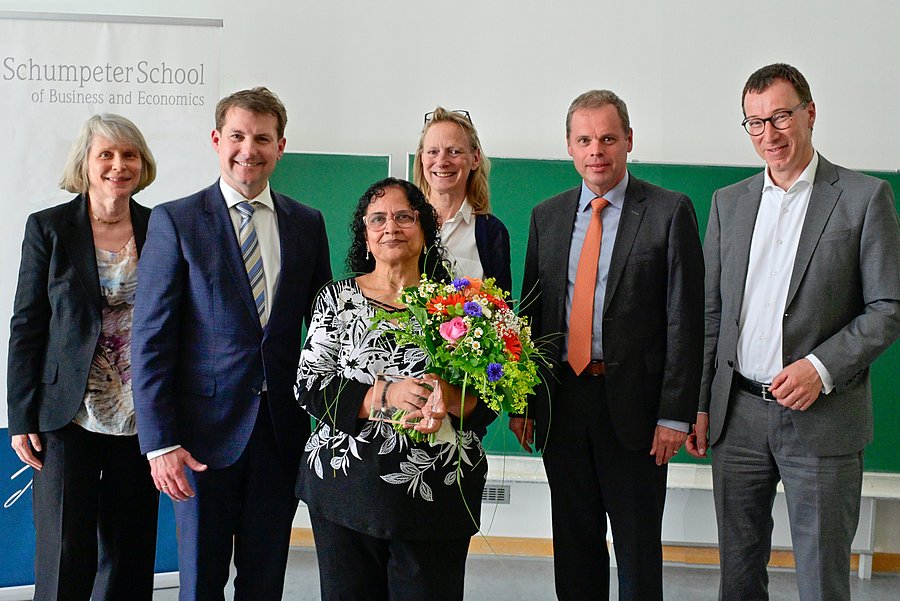Schumpeter School Prize 2025
Pioneer of entrepreneurial thinking honoured

Prof. Saras Sarasvathy (centre) accepted the award at the award ceremony on the Freudenberg campus. Sharing her joy were (from left to right): Prof Dr Christine Volkmann, Prof Dr Nils Crasselt, Prof Dr Birgitta Wolff, Prof Dr Peter Witt and Axel Jütz // Photo Michael Mutzberg
Prof Sarasvathy receives the award for her pioneering contributions to entrepreneurship research. She is best known as the founder of effectuation theory - an innovative approach that sheds light on entrepreneurial thinking and behaviour from a new, empirically sound perspective. Effectuation shows how entrepreneurs can realise innovations flexibly through the creative use of available resources and by acting in partnership - instead of strictly adhering to predetermined plans.
Her influential article "Causation and Effectuation: Toward a Theoretical Shift from Economic Inevitability to Entrepreneurial Contingency" is one of the most cited contributions in the entrepreneurship literature. This work builds on Schumpeter's ideas about the central role of innovative entrepreneurs and provides valuable insights into how they create innovative solutions in uncertain situations.
Internationally recognised theory with high practical relevance
Prof Sarasvathy enjoys worldwide recognition for her academic work. She has published over 60 scientific articles in renowned journals and authored eight books. Her achievements have been recognised many times - including with the Global Award for Entrepreneurship Research 2022, which is considered the most important international award in the field of entrepreneurship.
Saras Sarasvathy comes from Mumbai, India, and has founded several companies on three continents. She then turned to science. She obtained a Master's degree from Carnegie Mellon University in the USA in 1994 and completed her doctorate in 1998 under Nobel Prize winner Herbert A. Simon. She subsequently worked at several internationally renowned universities. Today, she holds the Paul M. Hammaker Chair of Business Administration at the Darden School of Business at the University of Virginia. Her scientific findings are incorporated into teaching programmes for aspiring founders all over the world.
Award ceremony with many guests from science and practice
The award ceremony on 13 June began in the morning with a scientific workshop in honour of the award winner. Renowned scientists from Germany and abroad presented papers that related to or built on Sarasvathy's work.
The award ceremony opened in the afternoon with welcoming addresses from the rector of the University of Wuppertal, Prof Dr Birgitta Wolff, the Dean of the Schumpeter School, Prof Dr Nils Crasselt, and the Chairman of the Board of the Schumpeter School Foundation, Prof Dr Peter Witt. The laudatory speech was given by Prof Dr Christine Volkmann. Afterwards, Prof Sarasvathy herself presented the basic principles of her excellent theory - illustrated with practical examples.
More than 90 invited guests attended the event, including Axel Jütz, Chairman of the Board of Stadtsparkasse Wuppertal and donor of the Schumpeter School Prize, as well as numerous other representatives from business and academia.
To the award
The Schumpeter School Prize for Business and Economic Analysis has been awarded every two years since 2011 by the Schumpeter School of Business and Economics for outstanding achievements in the field of Schumpeterian business and innovation research.
Schumpeterian research is often associated primarily with Schumpeter's seminal contributions in the fields of innovation and entrepreneurship, but extends to a wide range of other research areas and has influenced a broad spectrum of academic disciplines, such as economics, business administration, political science and sociology.
The prize is awarded to internationally renowned academics whose theoretical or empirical work is characterised by outstanding scientific quality and relevance. The prize committee is made up of elected representatives of the Schumpeter School of Business and Economics and the Schumpeter School Foundation.
Further information on the prize can be found at https://award.wiwi.uni-wuppertal.de/de/
